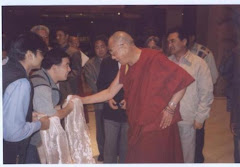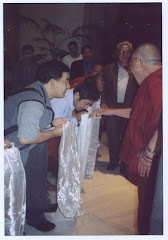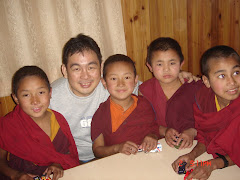Hi everyone,
Sherab is invited by Persatuan Penganut Buddha Bodhi (菩提工作坊)Kuala Lumpur to give a three-days talk at their centre near China Town (Petaling Street).
Based on the Theravada Metta Sutta, he will speak about love and compassion from the spiritual perspective of Mahayana Buddhism, Vajrayana's way of Mind Training as well as Integral Spirituality. There will be Q & A sessions as well. Admission is free.
Details:
Topic: Loving Kindness and Mahayana Mind Training
Date: 16th/23rd/30th December 2008 (Tuesday)
Address: 15 C, 3rd Floor, Jalan Sultan, 5000 Kuala Lumpue, Malaysia.
Tel: 603-20267605
for map download please visit:
Background
In Theravada Buddhism's Pali Canon, metta is one of the four "divine abodes" (Pali: brahmavihara) recommended for cultivating interpersonal harmony and meditative concentration (see, for instance, kammmatthana). In later canonical works (such as the Cariyapitaka), metta is one of ten "perfections" (parami) that facilitates the attainment of awakening (bodhi) and is a prerequisite to attaining buddhahood.
According to post-canonical Sutta Nipata commentary, the background story for the Metta Sutta is that a group of monks is harassed by earth-dwelling deities in a forest; when the monks seek the Buddha's aid in dealing with the deities, the Buddha teaches the monks the Metta Sutta for them to recite regularly; the monks do so and, as a result, win over the deities' good will.
In Theravada Buddhism's Pali Canon, metta is one of the four "divine abodes" (Pali: brahmavihara) recommended for cultivating interpersonal harmony and meditative concentration (see, for instance, kammmatthana). In later canonical works (such as the Cariyapitaka), metta is one of ten "perfections" (parami) that facilitates the attainment of awakening (bodhi) and is a prerequisite to attaining buddhahood.
According to post-canonical Sutta Nipata commentary, the background story for the Metta Sutta is that a group of monks is harassed by earth-dwelling deities in a forest; when the monks seek the Buddha's aid in dealing with the deities, the Buddha teaches the monks the Metta Sutta for them to recite regularly; the monks do so and, as a result, win over the deities' good will.
Contents
The Mettā Sutta contains a number of recollections or recitations that promote the development of mettā through virtuous characteristics and meditation.
The discourse identifies fifteen moral qualities and conditions conducive to the development of metta. These include such qualities as being non-deceptive (uju), sincere (suju), easy to correct (suvaco), gentle (mudu) and without arrogance (anatimani).
In terms of meditative development, the discourse identifies:
an intentional wish that facilitates generating metta (Pali: sukhino va khemino hontu; English: "May all beings be happy and safe")
a means for developing meditational objects (a list of various sizes, proximity, etc.) for such a wish a prototypical metaphor — of a mother's protective love for her only child — to be extended to all beings a method for radiating metta outwards in all directions
Use
It is often recited as part of religious services in the Theravada tradition. Cultivating mettā through the recitation of the Mettā Sutta is sometimes believed to have apotropaic powers within the Theravāda tradition.
It has been reported that Buddhist monks chanted the "Mettā Sutta" as part of their demonstration in September and October 2007 against the military in Burma.
(source: wikipedia)
The Mettā Sutta contains a number of recollections or recitations that promote the development of mettā through virtuous characteristics and meditation.
The discourse identifies fifteen moral qualities and conditions conducive to the development of metta. These include such qualities as being non-deceptive (uju), sincere (suju), easy to correct (suvaco), gentle (mudu) and without arrogance (anatimani).
In terms of meditative development, the discourse identifies:
an intentional wish that facilitates generating metta (Pali: sukhino va khemino hontu; English: "May all beings be happy and safe")
a means for developing meditational objects (a list of various sizes, proximity, etc.) for such a wish a prototypical metaphor — of a mother's protective love for her only child — to be extended to all beings a method for radiating metta outwards in all directions
Use
It is often recited as part of religious services in the Theravada tradition. Cultivating mettā through the recitation of the Mettā Sutta is sometimes believed to have apotropaic powers within the Theravāda tradition.
It has been reported that Buddhist monks chanted the "Mettā Sutta" as part of their demonstration in September and October 2007 against the military in Burma.
(source: wikipedia)














No comments:
Post a Comment